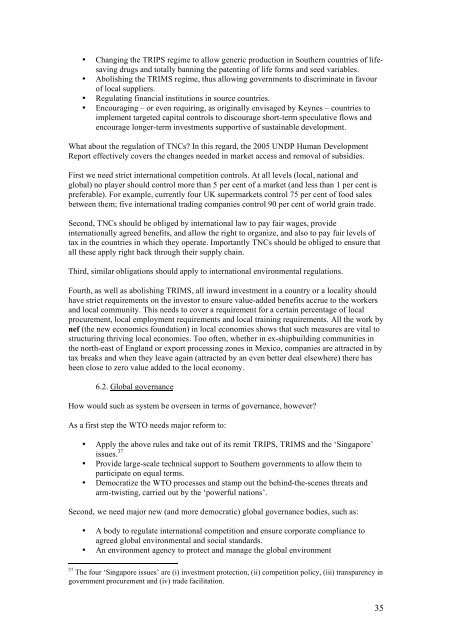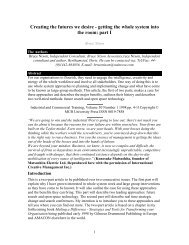From Old Economics to New Economics- Radical ... - Bruce Nixon
From Old Economics to New Economics- Radical ... - Bruce Nixon
From Old Economics to New Economics- Radical ... - Bruce Nixon
Create successful ePaper yourself
Turn your PDF publications into a flip-book with our unique Google optimized e-Paper software.
• Changing the TRIPS regime <strong>to</strong> allow generic production in Southern countries of lifesaving<br />
drugs and <strong>to</strong>tally banning the patenting of life forms and seed variables.<br />
• Abolishing the TRIMS regime, thus allowing governments <strong>to</strong> discriminate in favour<br />
of local suppliers.<br />
• Regulating financial institutions in source countries.<br />
• Encouraging – or even requiring, as originally envisaged by Keynes – countries <strong>to</strong><br />
implement targeted capital controls <strong>to</strong> discourage short-term speculative flows and<br />
encourage longer-term investments supportive of sustainable development.<br />
What about the regulation of TNCs In this regard, the 2005 UNDP Human Development<br />
Report effectively covers the changes needed in market access and removal of subsidies.<br />
First we need strict international competition controls. At all levels (local, national and<br />
global) no player should control more than 5 per cent of a market (and less than 1 per cent is<br />
preferable). For example, currently four UK supermarkets control 75 per cent of food sales<br />
between them; five international trading companies control 90 per cent of world grain trade.<br />
Second, TNCs should be obliged by international law <strong>to</strong> pay fair wages, provide<br />
internationally agreed benefits, and allow the right <strong>to</strong> organize, and also <strong>to</strong> pay fair levels of<br />
tax in the countries in which they operate. Importantly TNCs should be obliged <strong>to</strong> ensure that<br />
all these apply right back through their supply chain.<br />
Third, similar obligations should apply <strong>to</strong> international environmental regulations.<br />
Fourth, as well as abolishing TRIMS, all inward investment in a country or a locality should<br />
have strict requirements on the inves<strong>to</strong>r <strong>to</strong> ensure value-added benefits accrue <strong>to</strong> the workers<br />
and local community. This needs <strong>to</strong> cover a requirement for a certain percentage of local<br />
procurement, local employment requirements and local training requirements. All the work by<br />
nef (the new economics foundation) in local economies shows that such measures are vital <strong>to</strong><br />
structuring thriving local economies. Too often, whether in ex-shipbuilding communities in<br />
the north-east of England or export processing zones in Mexico, companies are attracted in by<br />
tax breaks and when they leave again (attracted by an even better deal elsewhere) there has<br />
been close <strong>to</strong> zero value added <strong>to</strong> the local economy.<br />
6.2. Global governance<br />
How would such as system be overseen in terms of governance, however<br />
As a first step the WTO needs major reform <strong>to</strong>:<br />
• Apply the above rules and take out of its remit TRIPS, TRIMS and the ‘Singapore’<br />
issues. 37<br />
• Provide large-scale technical support <strong>to</strong> Southern governments <strong>to</strong> allow them <strong>to</strong><br />
participate on equal terms.<br />
• Democratize the WTO processes and stamp out the behind-the-scenes threats and<br />
arm-twisting, carried out by the ‘powerful nations’.<br />
Second, we need major new (and more democratic) global governance bodies, such as:<br />
• A body <strong>to</strong> regulate international competition and ensure corporate compliance <strong>to</strong><br />
agreed global environmental and social standards.<br />
• An environment agency <strong>to</strong> protect and manage the global environment<br />
37 The four ‘Singapore issues’ are (i) investment protection, (ii) competition policy, (iii) transparency in<br />
government procurement and (iv) trade facilitation.<br />
35



